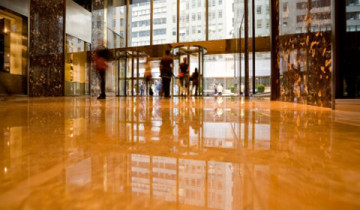Considerations for Commercial Flooring Projects
Trevino Flooring Company has a long history of providing beautiful, inviting, and durable flooring for commercial spaces in and around Chicago.

Trevino Flooring Company installs and maintains floors for high profile commercial spaces in and around Chicago
Whether you’re an architect, interior designer or an ambitious small business owner, it’s easy to become overwhelmed by all the choices in commercial flooring. With so many types of commercial flooring options, location, budget, installation, maintenance and durability are all important factors in determining the best flooring product for your needs. A professional flooring contractor can take the worry and stress out of your design project.
Here are the factors you need to consider when making your choice:
Business purpose
The purpose and character of your business or facility are critical to determining commercial flooring choices. A daycare center has vastly different needs than a medical office or a car dealership. Ask yourself these questions:
- Does your facility have heavy foot traffic?
- Do you need to provide some level of comfort to your visitors?
- What’s the humidity level like at your location?
- Is your building stable or do you have concerns about stability?
Budget
Your flooring budget will need to include the cost of materials and labor. Are you prepared for unseen expenses that may arise during the installation phase? There may need to be additional prep work, even if your contractor has assured you that the job will be smooth sailing.
In today’s marketplace, there is an ideal flooring material for every project; your task is to find the best choice for your application. All projects have budgets, and you should not hesitate to be open with your flooring contractor about your limitations. Clear communication will save you time and ultimately money by narrowing your options.
Installation
Unless you are building out a new business, installation may require that you close your business for a period of time.
Work out a plan with your flooring contractor to keep down time to a minimum. Make any arrangements well in advance including storage and moving equipment.
Never assume that the flooring contractor will also move your materials. Read your contract carefully to understand your obligations and include time limitations.
Entrance flooring
80% of dirt that will enter your business will come in from people’s shoes. Plan to include a heavy duty mat that will trap dirt and moisture from your customers’ and/or workers’ shoes. The mat should be big enough to at least allow people to take 4-10 steps-approximately 10 feet of matting.
Maintenance
Floor care maintenance is an ongoing expense for any business. Every type of commercial flooring will have associated costs.
Will you be paying employee wages for cleaning or hiring professional cleaners? The choices you make in your flooring materials will impact the cleaning costs. Carpets need vacuuming and frequent spot cleaning as well as regularly scheduled shampooing.
Vinyl, rubber, concrete and laminate all have their own cleaning requirements. Factor this expense into your overall budget from the very beginning.
Durability
It’s natural for every business owner to want to limit the expenses and associated upkeep of their flooring. Let’s face it, money spent on the floor generally isn’t as exciting as money spent bringing in new inventory.
Durability is often going to be a result of the quality of the flooring you purchase. It can be tempting to choose a less expensive flooring option, but experience shows that higher quality materials will outlast and out- perform lower priced alternatives.
Commercial flooring is a major investment that can and should last for years. Be critical in your assessment of your business’ needs so that you can openly discuss your budget and expectations with the flooring contractor.
